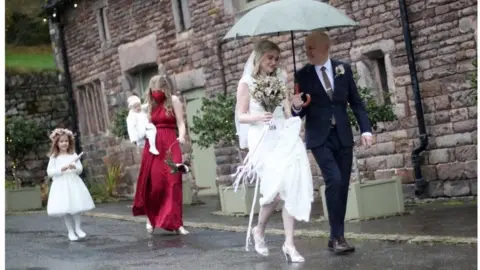Coronavirus: Wedding industry 'left out in the cold,' says Labour
 Reuters
ReutersThe wedding industry has been "left out in the cold" during the pandemic, Labour has said as it urges the government to provide more support.
The party estimates that the sector has lost out on more than £430m due to cancelled or postponed weddings.
Wedding receptions have either been banned or restricted to a limited number of people.
The government said wedding businesses could access the government's coronavirus support package.
But Labour has argued that some businesses are ineligible for support as they are technically still trading despite having little or no custom due to Covid restrictions.
The party said workers such as musicians and caterers were losing income due to the sharp decline in wedding receptions taking place since the beginning of March.
'Clear roadmap'
Earlier this month, the big supermarkets handed back almost £2bn to the Treasury in unneeded tax relief. Labour says this money should be used to fix "the gaping holes" in support for self-employed workers and struggling businesses.
The party also urged the government to publish a "clear roadmap" for the wedding industry including estimates of what venue capacity limits will be in April - allowing couples to plan their receptions.
Ed Miliband, Labour's shadow business secretary, said the government had left the wedding industry "out in the cold and failed to give them access to the support they need to survive".
"With a vaccine rollout in sight, the government must stop dismissing this important industry and help ensure these businesses are here on the other side of the crisis."
A government spokesperson said: "We know this is a very difficult period for wedding businesses.
"The current restrictions are essential so we can control the virus, protect the NHS and save lives, while enabling businesses to trade and weddings to go ahead in many regions.
"Wedding businesses can access the government's wide-ranging package of financial support worth £280bn, including the extended furlough scheme, various loan schemes, grants for businesses forced to close of up to £3,000 a month and grants of up to £2,100 per month to businesses which are not closed but are severely affected by restrictions."
